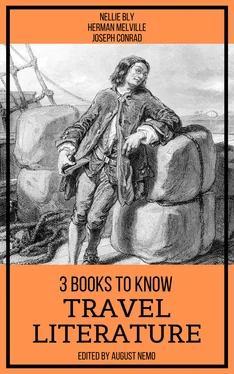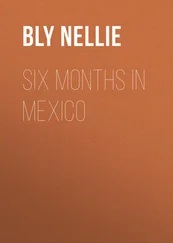“Do you get sea-sick?” I was asked in an interested, friendly way. That was enough; I flew to the railing.
Sick? I looked blindly down, caring little what the wild waves were saying, and gave vent to my feelings.
People are always unfeeling about sea-sickness. When I wiped the tears from my eyes and turned around, I saw smiles on the face of every passenger. I have noticed that they are always on the same side of the ship when one is taken suddenly, overcome, as it were, with one’s own emotions.
The smiles did not bother me, but one man said sneeringly:
“And she’s going around the world!”
I too joined in the laugh that followed. Silently I marveled at my boldness to attempt such a feat wholly unused, as I was, to sea-voyages. Still I did not entertain one doubt as to the result.
Of course I went to luncheon. Everybody did, and almost everybody left very hurriedly. I joined them, or, I don’t know, probably I made the start. Anyway I never saw as many in the dining room at any one time during the rest of the voyage.
When dinner was served I went in very bravely and took my place on the Captain’s left. I had a very strong determination to resist my impulses, but yet, in the bottom of my heart was a little faint feeling that I had found something even stronger than my will power.
Dinner began very pleasantly. The waiters moved about noiselessly, the band played an overture, Captain Albers, handsome and genial, took his place at the head, and the passengers who were seated at his table began dinner with a relish equaled only by enthusiastic wheelmen when roads are fine. I was the only one at the Captain’s table who might be called an amateur sailor. I was bitterly conscious of this fact. So were the others.
I might as well confess it, while soup was being served, I was lost in painful thoughts and filled with a sickening fear. I felt that everything was just as pleasant as an unexpected gift on Christmas, and I endeavored to listen to the enthusiastic remarks about the music made by my companions, but my thoughts were on a topic that would not bear discussion.
I felt cold, I felt warm; I felt that I should not get hungry if I did not see food for seven days; in fact, I had a great, longing desire not to see it, nor to smell it, nor to eat of it, until I could reach land or a better understanding with myself.
Fish was served, and Captain Albers was in the midst of a good story when I felt I had more than I could endure.
“Excuse me,” I whispered faintly, and then rushed, madly, blindly out. I was assisted to a secluded spot where a little reflection and a little unbridling of pent up emotion restored me to such a courageous state that I determined to take the Captain’s advice and return to my unfinished dinner.
“The only way to conquer sea-sickness is by forcing one’s self to eat,” the Captain said, and I thought the remedy harmless enough to test.
They congratulated me on my return. I had a shamed feeling that I was going to misbehave again, but I tried to hide the fact from them. It came soon, and I disappeared at the same rate of speed as before.
Once again I returned. This time my nerves felt a little unsteady and my belief in my determination was weakening, Hardly had I seated myself when I caught an amused gleam of a steward’s eye, which made me bury my face in my handkerchief and choke before I reached the limits of the dining hall.
The bravos with which they kindly greeted my third return to the table almost threatened to make me lose my bearings again. I was glad to know that dinner was just finished and I had the boldness to say that it was very good!
I went to bed shortly afterwards. No one had made any friends yet, so I concluded sleep would be more enjoyable than sitting in the music hall looking at other passengers engaged in the same first-day-at-sea occupation.
I went to bed shortly after seven o’clock. I had a dim recollection afterwards of waking up enough to drink some tea, but beyond this and the remembrance of some dreadful dreams, I knew nothing until I heard an honest, jolly voice at the door calling to me.
Opening my eyes I found the stewardess and a lady passenger in my cabin and saw the Captain standing at the door.
“We were afraid that you were dead,” the Captain said when he saw that I was awake.
“I always sleep late in the morning,” I said apologetically.
“In the morning!” the Captain exclaimed, with a laugh, which was echoed by the others, “It is half-past four in the evening!”
“But never mind,” he added consolingly, “as long as you slept well it will do you good. Now get up and see if you can’t eat a big dinner.”
I did. I went through every course at dinner without flinching, and stranger still, I slept that night as well as people are commonly supposed to sleep after long exercise in the open air.
The weather was very bad, and the sea was rough, but I enjoyed it. My sea-sickness had disappeared, but I had a morbid, haunting idea, that although it was gone, it would come again, still I managed to make myself comfortable.
Almost all of the passengers avoided the dining-room, took their meals on deck and maintained reclining positions with a persistency that grew monotonous. One bright, clever, American-born girl was traveling alone to Germany, to her parents. She entered heartily into anything that was conducive to pleasure. She was a girl who talked a great deal and she always said something. I have rarely, if ever, met her equal. In German as well as English, she could ably discuss anything from fashions to politics. Her father and her uncle are men well-known in public affairs, and by this girl’s conversation it was easy to see that she was a father’s favorite child; she was so broad and brilliant and womanly. There was not one man on board who knew more about politics, art, literature or music, than this girl with Marguerite hair, and yet there was not one of us more ready and willing to take a race on deck than was she.
I think it is only natural for travelers to take an innocent pleasure in studying the peculiarities of their fellow companions. We were not out many days until everybody that was able to be about had added a little to their knowledge of those that were not. I will not say that the knowledge acquired in that way is of any benefit, nor would I try to say that those passengers who mingled together did not find one another as interesting and as fit subjects for comment. Nevertheless it was harmless and it afforded us some amusement.
I remember when I was told that we had among the passengers one man who counted his pulse after every meal, and they were hearty meals, too, for he was free from the disease of the wave, that I waited quite eagerly to have him pointed out, so that I might watch him. If it had been my pulse, instead of his own, that he watched so carefully, I could not have been more interested thereafter. Every day I became more anxious and concerned until I could hardly refrain from asking him if his pulse decreased before meals and increased afterwards, or if it was the same in the evening as it was in the morning.
I almost forgot my interest in this one man, when my attention was called to another, who counted the number of steps he took every day. This one in turn became less interesting when I found that one of the women, who had been a great sufferer from sea-sickness, had not undressed since she left her home in New York.
“I am sure we are all going down,” she said one day in a burst of confidence, “and I am determined to go down dressed!”
I was not surprised after this that she was so dreadfully sea-sick.
One family who were removing from New York to Paris, had with them a little silver skye terrier, which bore the rather odd name of “Home, Sweet Home.” Fortunately for the dog, as well as for those who were compelled to speak to him, they had shortened the name into “Homie.”
Читать дальше












